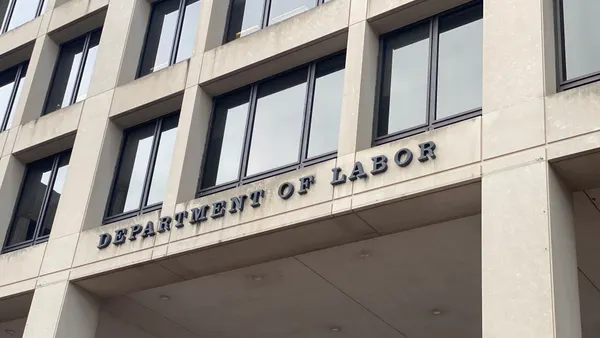Daria Weedo, a paralegal with Kaufman Dolowich & Voluck LLP and a late-deafened adult, has studied the impact of structural challenges for the Deaf/deaf and hard of hearing communities within the practice of law. Katherine S. Catlos is an employment law partner and is the firmwide Chief Diversity & Inclusion Officer for Kaufman Dolowich & Voluck. Opinions are authors' own.
In the decades following the enactment of the Americans With Disabilities Act more than 30 years ago, substantial measures have been taken to eradicate discrimination against people with disabilities. The ADA is a civil rights law that prohibits discrimination against individuals with disabilities in all areas of public life, including jobs, schools, transportation and all public and private places that are open to the general public.
However, this Act was structured to address a pre-digital world. In the time since, the United States Department of Justice, which enforces Title III of the ADA (public accommodations) has refused time and again to adopt clear regulations addressing website content accessibility for those who are deaf or hard of hearing, blind or low vision, or people with other various disabilities.
This proved to be true in a Title III 2019 filing (U.S. Equal Emp. Opportunity Comm'n v. Wal-Mart Stores, E., LP, No. CV 18-1314 (RMC), 2018 WL 5297814, (D.D.C. Oct. 25, 2018)). The "EEOC charged that Wal-Mart Stores East, LP refused to provide communications accommodations, such as access to sign language interpreters and closed-captioned training videos, to two deaf employees who worked at Walmart Store No. 5941." The case ultimately settled. Other than monetary relief, Walmart agreed to:
- Revise its reasonable accommodations management guidelines.
- Provide live training to management employees on the ADA's reasonable accommodations requirements, and address issues related to deaf or hard-of-hearing persons.
- Provide training to all non-management employees on the ADA and the process for requesting a reasonable accommodation.
The dark shadow of the COVID-19 pandemic further highlighted a pre-existing and often unaddressed issue, which is the lack of inclusion to the roughly 48 million members of the Deaf and hard of hearing community to digital content.
At the onset of the pandemic in March 2020, in-person meetings were rushed to virtual platforms, (i.e., Zoom, Blue Jeans, Microsoft Teams). It was soon learned that many of these video platforms did not offer captioning or live transcription services, thus posing a problem for those afflicted with hearing loss in conducting their business remotely.
We were also introduced to the requirement of face masks. There are different types of hearing loss, and not every person with a hearing disability uses the same method of communicating. For instance, for those who rely on speech/lip reading, the use of masks rendered their learned method of communication non-existent.
Additionally, for members of the Deaf community who rely on American Sign Language to communicate, the masks inhibit facial movements and expressions which are an integral part of ASL's grammar.
In response to the issues raised above, the number of claims and litigation initiated against businesses has soared, and companies are finally responding:
- Sept. 23, 2020: A federal district court ordered the White House to provide American Sign Language interpreters, live streamed on its website, for all public briefings held by the President, Vice President, and Press Secretary that addressed the COVID-19 pandemic.
- Jan. 27, 2021: Nike reached a proposed settlement in an ADA Face Mask Lawsuit. In July of 2020, the plaintiff filed a class action complaint against Nike alleging violations of the ADA and corresponding California public accommodation laws.
In her complaint, the plaintiff alleged while visiting a Nike store in San Diego: "The salesperson responded by expressing frustration with plaintiff, which plaintiff found embarrassing and demeaning to her. The salesperson did not lower his mask, provide an auxiliary aid, or make any other attempt to effectively communicate with plaintiff." Plaintiff argued the opaque masks worn by Nike employees caused communication difficulties because they "muffle sound and conceal the wearers' mouths and facial expressions."
This lawsuit ultimately settled, and Nike agreed to:
- Provide transparent face masks to its California store employees.
- Provide pens and paper to its retail employees so those employees can more easily communicate with deaf and hearing-impaired customers;
- Train employees to better accommodate customers who are deaf or hard of hearing; and
- Post signs at entrances of stores directing those with hearing loss who need assistance.
Other companies have moved to catch up in this area, too. Ford is designing a medical-grade face mask that reveals wearers' facial expressions and also allows hearing-impaired people to read lips, for example. Earlier this year, Zoom announced it was working towards making automatic closed captioning available to all users in the fall of 2021, including nonpaid members. And in April, popular social media app TikTok introduced a feature which automatically generates subtitles on videos, allowing viewers to read or listen to content.
Though great strides have been made within the past year to address these discrepancies, there is still much work to be done. Employers and business owners still have a duty to provide full and equal access to customers and/or employees, regardless of the ADA. It is typically assumed that changes are costly or time consuming, but this is not always the case.
Sometimes the smallest changes have the largest impact. These are just a few to get started:
- Reaffirm your handbook: Handbooks should remain current and compliant. Consider consulting an attorney or your HR team to revise your handbook for 2021 to address the interactive process and accommodations.
- Educate your team: Take a cue from Nike and train your staff or employees on how to properly address and/or communicate with a disabled individual.
- Make your website and mobile app compliant: The current practice is to make your website conform to WCAG 2.1 AA.
- Consult a professional: Consult a third-party company to manually audit your website intermittently and/or evaluate your properties to make sure they comply with the ADA for accessibility.
Because the ADA came into being so long ago, change and the expansion of employee protections is inevitable. Forward thinking businesses will attempt to get ahead of the curve to ensure that all disabled individuals can enjoy equal opportunity services and products. In addition to preventing legal claims, it is good business; it is estimated that 20% of the American work force is disabled, representing more consumer growth.












